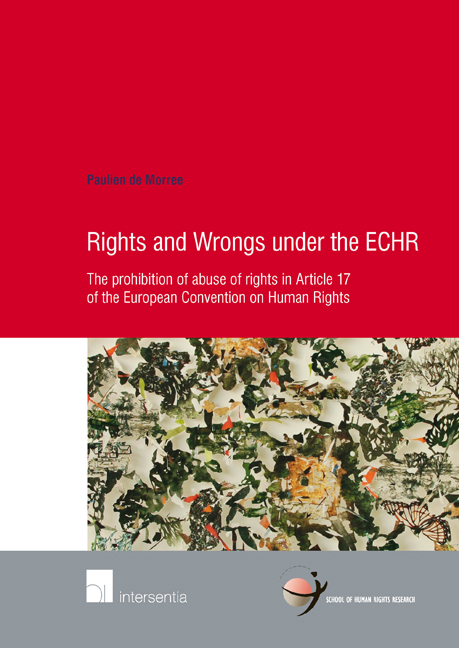 Rights and Wrongs under the ECHR
Rights and Wrongs under the ECHR Book contents
- Frontmatter
- Acknowledgements
- Contents
- List of Abbreviations
- Chapter 1 Introduction
- Chapter 2 The Creation of the European Convention on Human Rights
- Chapter 3 The Strasbourg Case Law on Article 17 ECHR
- Chapter 4 The Interpretation of Article 17 Echr in Legal Doctrine
- Chapter 5 Other Abuse Clauses in Human Rights Law
- Chapter 6 The Concept of Abuse of Rights
- Chapter 7 The Concept of Militant Democracy
- Chapter 8 The German ‘Wehrhafte Demokratie’
- Chapter 9 Militant Democracy in the Context of the ECHR
- Chapter 10 Conclusions
- Bibliography
- Table of Cases
- Samenvatting
- Curriculum Vitae
- School of Human Rights Research Series
Chapter 1 - Introduction
Published online by Cambridge University Press: 12 December 2017
- Frontmatter
- Acknowledgements
- Contents
- List of Abbreviations
- Chapter 1 Introduction
- Chapter 2 The Creation of the European Convention on Human Rights
- Chapter 3 The Strasbourg Case Law on Article 17 ECHR
- Chapter 4 The Interpretation of Article 17 Echr in Legal Doctrine
- Chapter 5 Other Abuse Clauses in Human Rights Law
- Chapter 6 The Concept of Abuse of Rights
- Chapter 7 The Concept of Militant Democracy
- Chapter 8 The German ‘Wehrhafte Demokratie’
- Chapter 9 Militant Democracy in the Context of the ECHR
- Chapter 10 Conclusions
- Bibliography
- Table of Cases
- Samenvatting
- Curriculum Vitae
- School of Human Rights Research Series
Summary
RIGHTS AND WRONGS UNDER THE ECHR
In 1956 the German Federal Constitutional Court held that the German Communist Party posed a threat to the ‘free democratic basic order’ and declared it unconstitutional. The party subsequently challenged its prohibition before the European Commission of Human Rights, arguing that it constituted a violation of its rights to freedom of expression and freedom of association. The Commission, however, found that advocating the establishment of a social communist society through a proletarian revolution was incompatible with the free operation of democratic institutions.
In a hallmark case from the 1990s, the French philosopher, former politician and author of the book ‘The Founding Myths of Modern Israel’, Roger Garaudy, was convicted of disputing the existence of crimes against humanity, public defamation of a group of persons – in this case, the Jewish community – and incitement to racial hatred. In his book, Garaudy openly disputed the Holocaust and referred to the use of gas chambers by the Nazis as a myth. He argued that the criminal conviction amounted to an unjustified interference with his right to freedom of expression. The Court found that with the revisionist tenor of the book, the applicant attempted to deflect the right to freedom of expression from its real purpose by using it for ends which are contrary to the text and spirit of the Convention.
In 2002 Mark Anthony Norwood, an active member of the extreme right-wing British National Party, was convicted of aggravated hostility towards a religious group for displaying in the window of his flat a large poster with a photograph of the Twin Towers in flames, the words ‘Islam out of Britain – Protect the British People’ and a symbol of a crescent and a star in a prohibition sign. He complained before the European Court of Human Rights that the conviction violated his right to freedom of expression. The Court, however, found that ‘such a general, vehement attack against a religious group, linking the group as a whole with a grave act of terrorism, is incompatible with the values proclaimed and guaranteed by the Convention, notably tolerance, social peace and non-discrimination’.
And in 2003 the German Federal Ministry of the Interior prohibited the activities of the international Islamic organisation Hizb Ut-Tahrir on German territory.
- Type
- Chapter
- Information
- Rights and Wrongs under the ECHRThe prohibition of abuse of rights in Article 17 of the European Convention on Human Rights, pp. 1 - 14Publisher: IntersentiaPrint publication year: 2016
